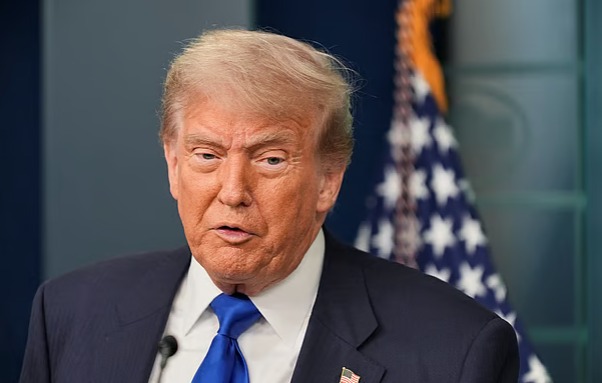Desk Report,
Trump is imposing indirect tariffs on Russia, what is the impact on the global economy?
Despite facing the world’s most severe sanctions, Russia is continuing its war in Ukraine, relying on its vast energy resources. However, US President Donald Trump is now seeking to cut off that funding.
Trump is imposing indirect tariffs on Russia, what is the impact on the global economy?
Trump has announced that if a ceasefire is not reached by August 8, 100% indirect tariffs will be imposed on all countries doing business with Russia.
This means that the United States will impose a 100% tariff on products imported from any country that does business with Russia. That is, those products will enter the US market at double the price.
Russia’s main export sectors are oil and gas. Major buyers of these products include China, India and Turkey. Trump said a month ago, ‘I have used trade for many purposes, but there is nothing better than stopping wars.’ The Trump administration had previously used such tariffs in the case of Venezuela. However, analysts believe that imposing such indirect tariffs in the case of Russia will have a greater impact on the global economy. Russia is the world’s third largest oil producer. It ranks after Saudi Arabia and the United States. However, Bloomberg reported that its energy exports are declining in 2025. In this context, Kieran Tomkins of Capital Economics said that if indirect taxes are imposed on countries that buy Russian energy, the biggest impact on the global economy will be through energy prices. If this tax is implemented, the supply of energy in the world market will decrease. As a result, prices will increase.
This is exactly what happened during Russia’s full-scale invasion of Ukraine in 2022—inflation increased worldwide. However, this time Trump says that he is not worried about the record amount of oil production in the United States. In addition, analysts believe that the market may remain somewhat stable due to the excess production capacity of OPEC and its allies.
Russia’s strategy to avoid sanctions
Russia has already created a kind of shadow fleet to avoid sanctions—its oil trade is carried out through hundreds of ownerless tankers. This ‘shadow fleet’ is helping to keep Russia’s oil and gas exports secret.
Richard Nephew, a sanctions expert at Columbia University in the US, said that the implementation of sanctions is a bigger task than imposing them. Because those on whom sanctions are imposed try their best to avoid them.
Double duty on Indian iPhone imports
India became Russia’s second largest oil buyer after the Russia-Ukraine war began in 2022. Trump recently told CNBC that they are fueling the war machine. He has no room to be happy in this situation.
If this indirect tax comes into effect, a 100 percent duty will be imposed on all products imported from India to the United States. As a result, US companies will be encouraged to buy products from other sources. As a result, India’s exports will decrease. This may make India reconsider buying Russian oil – this is the logic.
Especially since companies like Apple are now manufacturing iPhones in India and exporting them to America – the price of those products may double. Because, the importing companies pay these duties and in most cases this additional cost is imposed on the consumer. There is already a 25 percent duty on Indian goods. Trump has indicated that this duty may be increased much more.
India considers this step as a two-pronged policy. The country said in a statement that the United States itself still imports raw materials for nuclear fuel and fertilizers from Russia – the amount will exceed 3 billion or 3 billion dollars in 2024.
New conflict with China
China is Russia’s largest oil buyer. But imposing similar indirect duties on Chinese goods would be very complicated. Because the United States imports five times more goods from China than India every year – mostly toys, clothing and electronic products.
Such a move could become a major obstacle in the Trump-Xin Ping trade talks. Simon Evenet, a professor at the IMD Business School, said that this additional pressure will not affect China at all; on the contrary, the relationship between the two countries will go down further.
Europe will also suffer
According to the European research organization Center for Research on Energy and Clean Air, the European Union and Turkey are still one of the largest energy buyers of Russia. After 2022, Europe has reduced imports a lot, but has not stopped completely.
EU Commission President Ursula von der Leyen recently said that imports from Russia will be completely stopped by 2027. However, the US-EU trade environment is the largest in the world. Some agreements have been made between them, including imposing a new 15 percent tariff. Now if a 100 percent tariff is imposed again due to trade with Russia, then European exporters will be seriously affected. It may be difficult to procure medicines and equipment from elsewhere. As a result, the Americans will also be forced to pay higher prices.
Will Russia fall into recession
Russia’s growth in 2024 was 4.3 percent. Despite this claim, the country’s Finance Minister Maxim Reshetnikov recently said that the economy is now on the verge of recession. The International Monetary Fund (IMF) predicts that Russia’s growth will be just 0.9 percent in 2025.
The true impact of the war is difficult to gauge, as Moscow has kept much of its economic data secret, particularly on oil and gas production.
Russia currently spends about a third of its government spending on energy. But its exports are falling, while its defense budget is rising—to its highest level since the Cold War, or 6.3 percent of GDP. Russia’s economy is much larger than Ukraine’s.



